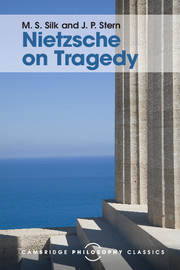Book contents
- Frontmatter
- Dedication
- Epigraph
- Contents
- Preface to this edition
- Preface
- Note
- 1 Germany and Greece
- 2 Biographical background I: Nietzsche and his early interests
- 3 Biographical background II: the genesis of The Birth of Tragedy
- 4 The argument of The Birth of Tragedy
- 5 The aftermath
- 6 Nietzsche's account of Greece
- 7 Mode and originality
- 8 Tragedy, music and aesthetics
- 9 Nietzsche and earlier German theories of tragedy
- 10 Style and philosophy
- Bibliography
- Index
9 - Nietzsche and earlier German theories of tragedy
Published online by Cambridge University Press: 05 August 2016
- Frontmatter
- Dedication
- Epigraph
- Contents
- Preface to this edition
- Preface
- Note
- 1 Germany and Greece
- 2 Biographical background I: Nietzsche and his early interests
- 3 Biographical background II: the genesis of The Birth of Tragedy
- 4 The argument of The Birth of Tragedy
- 5 The aftermath
- 6 Nietzsche's account of Greece
- 7 Mode and originality
- 8 Tragedy, music and aesthetics
- 9 Nietzsche and earlier German theories of tragedy
- 10 Style and philosophy
- Bibliography
- Index
Summary
Lessing
An ironist might observe that the unbroken sequence of German theories of tragedy from Lessing to Brecht and beyond constitutes a body of writing at least as interesting, and possibly more interesting, than the German tragedies which were written during that time. And even though the statement is unfair and an exaggeration, it does reflect a tenacious preoccupation with the theory of drama and the idea of ‘the tragic’ which has no parallel in any other literature. Nietzsche's own theory must be assessed, as we have tried to assess it, as a contribution to the understanding of tragedy in its own right. At the same time, consideration of the German theoretical tradition to which he belongs provides a necessarý perspective. In the first place it helps to explain the extra-literary character of his interest in the tragic stage. The particular existential slant of his theory may be his own, but throughout this long line of theories tragedy is anything but a narrowly literary concern. Correspondingly, the theorists tend tacitly to agree with Nietzsche that detailed technical analyses of an Aristotelian kind are not their business. Nietzsche, once again, may have a special aversion to technicalities, but the German theorists as a whole are not given to them. It may sound paradoxical, but their theories are more philosophically far-ranging than Aristotle's, while his is more detached, more ‘aesthetic’ in the Kantian sense; but then, the Kantian critical mode of thought is closer to Aristotle than to the speculative theoreticians of the post-Kantian era.
Lessing's observations in Hamburg Dramaturgy II (1759), our first case in point, reflect that multiplicity of interests, or rather cares, of which Nietzsche remarked that they squandered Lessing's finest gifts. Dramatic critic and dramatist, cosmopolitan and patriot, theologian and enlightened moralist, savant and popularizer – Lessing pursues all these callings and uses his theorizing about drama in each of them. We may summarize his thinking – to the extent that it is relevant to our historical sketch – under three headings, all of which really point in the same direction:
(i) The theatre is an inculcator of virtues.
(ii) The theatre – or rather the taste for it – is a matter of national culture, and consequently the virtues (that is, a people's sense of values) are at least co-determined by historical and national considerations.
- Type
- Chapter
- Information
- Nietzsche on Tragedy , pp. 356 - 395Publisher: Cambridge University PressPrint publication year: 2016



